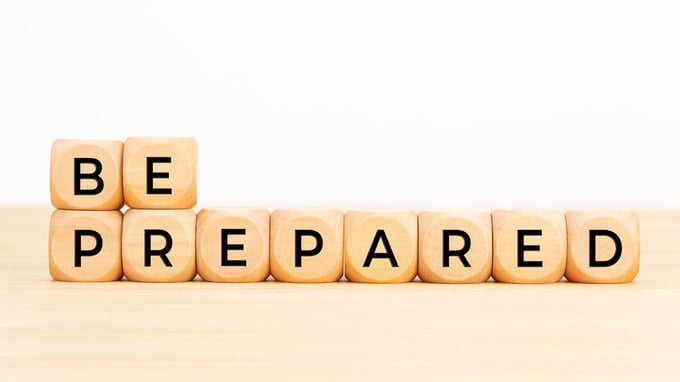Disasters — natural and manmade — happen every day. Here are questions you can ask yourself as a small business owner to assess your preparedness.

By asking yourself questions related to your business’ disaster readiness, you can get a stronger sense of weak points in your business plan — and make arrangements to ensure that when disaster strikes, you can resume operations with few hurdles. Once you have the answers to the key questions below, be sure to add this to your business plan and revise it regularly.
1. What are the industry-specific risks that could impact my small business?
Understanding industry-specific risks is essential. For example, a retail business may face different challenges than a manufacturing or service-based business.
2. What natural disasters are common in my immediate geography?
Identifying potential natural disasters, such as floods, earthquakes, hurricanes, or wildfires, is crucial for developing appropriate preparedness measures.
3. What is the likelihood of a cybersecurity breach, and how can I protect my business’ digital assets?
Assessing the risk of cyberattacks and implementing cybersecurity measures, including firewalls, antivirus software, and employee training, can help you prevent an outage or business closure.
4. Do I have a comprehensive emergency response plan in place?
Small business owners should establish and regularly update an emergency response plan, including evacuation procedures, communication protocols, and roles and responsibilities during a crisis. This should be included in your business plan and revised regularly. In order for a disaster preparedness plan to be effective, it needs to be a living document.
5. What is the level of physical security at my location?
Evaluating physical security measures — such as access controls, surveillance systems, and alarm systems — helps in mitigating risks related to theft, vandalism, or unauthorized access.
6. How dependent is my business on key suppliers and vendors?
Assessing the reliance on specific suppliers and vendors, then developing contingency plans for supply chain disruptions and inventory gaps, can ensure continuity of your business despite the financial pain caused by delays, price variances, and issues from supplier shortfalls.
7. Have I reviewed and updated my insurance coverage recently?
Regularly reviewing insurance policies, including property insurance, business interruption insurance, and cyber insurance, ensures that coverage adequately addresses potential risks.
8. Do I have a data backup and recovery plan in place?
Implementing a robust data backup and recovery plan helps protect critical business information and ensures operations can resume quickly after a data loss event.
9. What are the potential safety hazards in my workplace, and how can I reduce the risk of injury?
Identifying and addressing safety hazards in the workplace — such as slippery floors or faulty equipment — contributes to employee well-being and minimizes the risk of accidents.
10. Have I established communication channels for emergencies?
Setting up effective communication channels, both internal and external, is critical for disseminating information during and after a crisis.
11. What is the financial impact of potential risks on my business?
Evaluating the financial consequences of identified risks helps prioritize risk management efforts and allocate resources strategically. Having a line of credit from a Community Development Financial Institution (CDFI) like DreamSpring can ensure you can access funds in an emergency.
12. Am I in compliance with relevant regulations and industry standards?
Ensuring compliance with regulations and industry standards is essential for avoiding legal and regulatory risks. You can connect with your local state’s office for small businesses or economic development to help get started in reviewing your compliance practices. Many local governments and municipalities also have offices to help entrepreneurs review compliance and understand local and statutes.
13. How can I engage with the local community and build partnerships for mutual support during emergencies?
Collaborating with local emergency services, community organizations, and neighboring businesses can enhance your small business resilience while also spreading the word about your small business!
By addressing these questions, you can build confidence that your business is ready for a disaster. Regular reviews and updates to the risk assessment are essential to adapt to changing circumstances and emerging risks.

